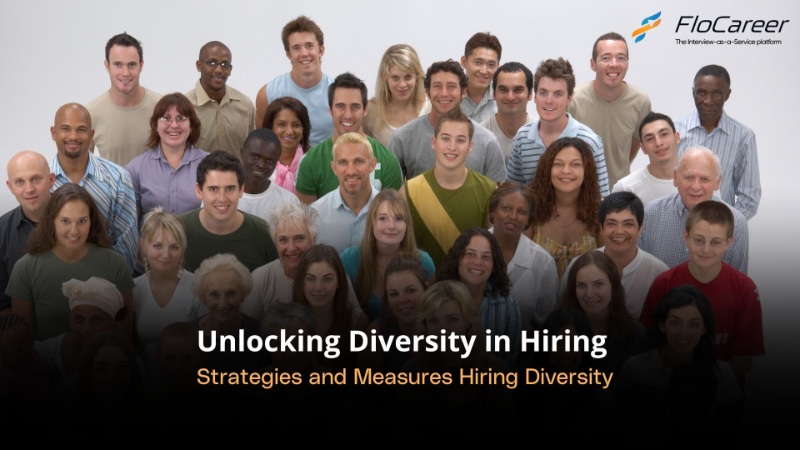Unlocking Diversity in Hiring: Strategies and Measures Hiring Diversity
In the dynamic landscape of today's workforce, fostering diversity has become an integral part of organizational growth. Companies worldwide are dedicating significant resources to diversity, equity, and inclusion initiatives, making it crucial to measure and enhance diversity in the hiring process. This article delves into the strategies and measures that organizations can adopt to create a more inclusive workforce.

Understanding the Significance of Diversity:
Before exploring how to measure diversity in hiring, it's essential to recognize the profound impact diversity has on organizational success. A diverse workforce brings a myriad of perspectives, ideas, and approaches, fostering innovation and effective problem-solving. Moreover, prioritizing diversity is not just a strategic move but also a moral imperative, ensuring equal opportunities for everyone, irrespective of their background.
Strategies for Measuring Diversity in Hiring:
Track Essential Data:
Understanding and measuring diversity begins with tracking essential data. Companies must meticulously analyze their workforce composition, assessing the current diversity levels. Retention rates, including attrition rates based on gender and other demographics, should also be closely monitored. Utilizing Human Resources Information Systems (HRIS) and Applicant Tracking Systems (ATS) streamlines the data analysis process.
1. Scoring Systems for Interviews:
To identify potential biases in the hiring process, organizations can implement scoring systems for interviews. By analyzing interview scores across different demographics and teams, it becomes possible to pinpoint any systemic differences. Utilizing statistical approaches such as t-tests and analysis of variance (ANOVA) helps identify disparities and achieve a more balanced hiring procedure.
2. Clear Communication:
Transparent and respectful communication is vital when measuring diversity. Conducting surveys can be an effective way to gather valuable insights. To ensure an inclusive approach:
- Clearly communicate the purpose of the survey, emphasizing diversity and inclusion.
- Guarantee anonymity in the survey and data collection process.
- Make the survey optional for job applicants, assuring that it won't impact their application status.
- Use careful and respectful language in the survey, addressing various aspects of candidates' identities.
3. Analysis of Survey Data:
Once survey data is collected, it's crucial to analyze it comprehensively. This involves:
- Establishing a diversity standard and comparing numbers at each pipeline stage.
- Identifying inconsistencies in promotions, perks, and advancements based on different characteristics.
- Recognizing any gaps or differences in benefits, pay, and bonuses to ensure equal opportunities for every candidate.
4. Diversity Recruitment Initiatives:
In addition to tracking data and implementing scoring systems, organizations can proactively engage in diversity recruitment initiatives. This involves:
- Collaborating with diverse talent networks, organizations, and communities to expand the pool of candidates.
- Actively participating in job fairs, events, and conferences that target diverse audiences.
- Establishing partnerships with educational institutions that promote diversity in their programs.
5. Inclusive Job Descriptions and Requirements:
Crafting inclusive job descriptions is crucial to attract a diverse range of candidates. Ensure that job descriptions:
- Use inclusive language that appeals to candidates from various backgrounds.
- Focus on the essential skills and qualifications necessary for the role, avoiding unnecessary requirements that may exclude qualified individuals.
- Highlight the organization's commitment to diversity and inclusion.
6. Diverse Interview Panels:
To foster diversity in hiring decisions, organizations can form interview panels that reflect a variety of perspectives. This strategy involves:
- Ensuring that interview panels include individuals from different departments, levels, and backgrounds.
- Training interviewers to recognize and eliminate unconscious biases during the evaluation process.
- Encouraging collaborative decision-making to mitigate individual biases.
7. Continuous Training on Diversity and Inclusion:
Implementing ongoing training programs for hiring managers and employees is crucial. This includes:
- Conducting regular workshops and seminars on diversity, equity, and inclusion.
- Providing resources and tools to help interviewers become more aware of their biases.
- Encouraging a culture of continuous learning and improvement within the organization.
8. Mentorship and Sponsorship Programs:
Establishing mentorship and sponsorship initiatives can contribute to a more diverse talent pipeline. This involves:
- Pairing underrepresented employees with mentors who can provide guidance and support.
- Creating sponsorship programs where influential leaders advocate for the career advancement of diverse talent.
- Monitoring and measuring the success of these programs in terms of career progression.
9. Analyzing Exit Interview Data:
Organizations can gain insights into diversity challenges by analyzing data from exit interviews. This includes:
- Identifying patterns related to why employees from diverse backgrounds may choose to leave.
- Addressing any diversity-related concerns raised during exit interviews to enhance retention efforts.
- Using this data to refine hiring and retention strategies continually.
- Establishing ERGs within the organization allows employees to connect based on shared characteristics or life experiences. This involves:
- Supporting and promoting ERGs that focus on diversity, providing a platform for employees to share insights and experiences.
- Seeking input from ERGs when crafting diversity initiatives and policies.
- Leveraging ERGs as a resource for recruiting diverse talent.
Flocareer, as a leading provider of interview outsourcing services, plays a crucial role in promoting diversity in hiring. Through its innovative approach to interview processes, Flocareer ensures unbiased assessments, minimizing systemic biases in the hiring journey. By outsourcing interviews with Flocareer, organizations can benefit from a diverse pool of candidates, contributing to the creation of an inclusive workforce.
Measuring diversity in hiring is not merely a statistical exercise; it's a commitment to creating a workplace where every individual feels valued and empowered. Organizations that actively embrace diversity, equity, and inclusion in their hiring practices contribute to building a workforce that reflects the richness of our global society. With Flocareer as a strategic partner, organizations can elevate their hiring processes, ensuring fairness and diversity at every step. Together, let's pave the way for workplaces that celebrate the unique contributions of every team member.
Check out our latest blog on Crafting Culture Fit Interview Questions


